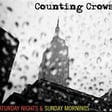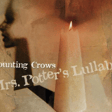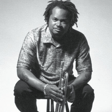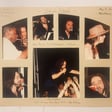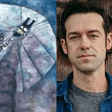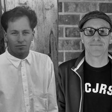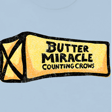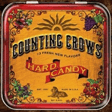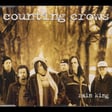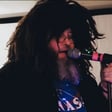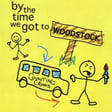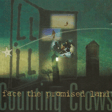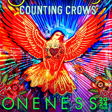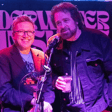Become a Creator today!Start creating today - Share your story with the world!
Start for free
00:00:00
00:00:01

E15: Across a Wire (Part I)
By popular demand, we get into all the details and conduct a complete review of the Crows' unique and historic double live acoustic/electric album "Across a Wire: Live in New York City."
Chris and Eric are again joined by Geoff Harkness.
In addition, we welcome music journalist Will Hodge
https://twitter.com/will_hodge
as well as entertainment journalist / podcaster Ryan McCaffrey
Contact the Pod:
SullivanStreetPC@protonmail.com
Transcript
Introduction: Across the Wire by Counting Crows
00:00:15
Speaker
Welcome to Sullivan Street, where we're going to talk about fan favorite album, maybe one of the most unique album of all time and the first official live recording by the Counting Crows across the wire. But first, I will say hello to my co-host, Chris Megs. Chris, how are you? I'm good. I'm really excited to talk about this one. I have a theory about this record, which is that this is the sort of the demarcator between liking Counting Crows and loving Counting Crows.
00:00:45
Speaker
If you've got a friend and they say, I like counting crows and you're like, hmm, maybe I can get them deeper into this. I really feel like you can put this and in particular one song, which I'll talk about later, but you put this record on and you figure out, okay, do they love counting crows or are they going to be, you know, one of those people that you're like, Oh yeah, you went to see them in concert again. You're like, yeah, yeah, that's fine. Anyway, I think this is the dividing line. Now that sounds about right to me. I had, I have had a number of,
00:01:15
Speaker
listeners to the podcast right and said they're looking forward to this episode or they have opinions. And some, I'm not joking, say that it is their favorite Counting Crows album, Barnard. So we'll talk about that.
Fan Journeys with Counting Crows
00:01:25
Speaker
And also hello to regular contributor Counting Crows historian, Jeff Harkness. Jeff, welcome back to the program. Thank you. Thank you. Always, always a pleasure to be back. Thank you. And we'll get his
00:01:38
Speaker
take and lessons learned and history lessons with Across the Wire. And we have two other guests to the program. First, entertainment journalist and podcast host, Ryan McCaffrey. Ryan, welcome to the program.
00:01:52
Speaker
Thank you so much for having me. I just got done. I'm going to plug Jeff's book right here, Rain King the Life and Music of Adam Dirksen, Counting Crows, who's finished it this week. I bought it when I first heard Jeff's first appearance on the podcast to talk about the book and made my way through this week. And great read. And as somebody that's been a super fan of the band for, well, since the 90s, five, like mid-90s,
00:02:15
Speaker
There was plenty in there that was new to me that I did not know. So everybody listening to this should pick it up. It's a great read. Thank you. I'm sure Jeff appreciates that. I'll send the checkout immediately. It's out of the way. Ryan, we'll hear more about this during the show, but one thing we always ask first time visitors to the show, when did you become a Counting Crows fan and what keeps you coming back to the Crows?
00:02:45
Speaker
So my quick Counting Crow's origin story is that I never really got way into music until into my teens. And Counting Crows was just the first band to really speak to me. I don't know if I had heard Mr. Jones on the radio at the time in the car. And then I do remember my dad had August and everything after. And I basically stole it from him and just started completely going down the Counting Crow's rabbit hole.
00:03:14
Speaker
So that was around 94, 95 for me. So August had been out for a little while and yeah, I've just never looked back. Their music has just always, it's really just always spoken to me on a level that really no other band particularly has. And it's just everything that the band has done is, I love how just unique every piece of music they put out is, every record where for me,
00:03:44
Speaker
Recovering the satellites was like my high school album. This Desert Life was my college album. Hard Candy was another era of my life. And so yeah, that's the long version. Sorry, I know it should have been the short version, but big 90s for me, and I've been a fan ever since.
00:03:59
Speaker
That's exactly the kind of answer we're looking for. That's great. And I'm looking forward to hearing your take on the album and how the crews have informed your journey in life. So the last guest today, music journalist, Will Hodge. Will, thank you so much for joining. Awesome. Thanks so much. I'm super stoked to have this conversation across a wire is not only probably
00:04:24
Speaker
Probably my favorite Counting Crows album, but I think it's not just one of the best albums, live albums of the 90s, but probably one of the best and most innovative live albums overall, which, yeah, we'll get into it. But yeah, I'm pretty excited to have this chat. And Will, what about you? How did you first become a Crows fan and what keeps you coming back?
00:04:48
Speaker
So August came out when I had just started like eighth grade. And while I was mostly listening to like alternative and hip hop and punk music, there was this like subset of more like literary sort of acoustic heavy alt rock bands that I really liked like Indigo Girls, Ten Thousand Maniacs, even like Crash Test Dummies, where bands that I really liked their music and their lyrics were
00:05:18
Speaker
really poetic and nuanced and had a lot of emotional substance. And so August, as soon as I heard it, it definitely fell into that camp for me, except that they could do all that and they could also really rock, you know, with songs like Rain King and Murder 1 later with
00:05:36
Speaker
Angels of the Silences, which is probably my own personal favorite of their catalog. Yeah, I just I really loved it. And so I hope it doesn't get me kicked off the podcast too early, but I am one of the folks who absolutely loved August. Recovering the Satellites was a huge record for me
Will Hodge's Insight on Counting Crows
00:05:54
Speaker
when it came out. Whenever Across a Wire came out, I really thought it was going to submit Counting Crows as this creatively unparalleled live band in the alt rock scene.
00:06:07
Speaker
But then unfortunately, like when hanging around came out in like 99, I had sort of like a personal disconnection with the band that I haven't really been able to kind of kick back into. So I'm one of the fans. I don't know if there's a special name for it within the community, but I'm like deeply soul level entrenched with those first three releases August satellite and across a wire.
00:06:33
Speaker
but I haven't really been able to get super deep into anything else that they've released since then. And I still spend those three records like crazy though. That's the thing is, those records don't stay in the 90s for me. They're still very much a present part of.
00:06:49
Speaker
Being very enjoyable to me. So that's that's fine. I'm sure we'll convince you otherwise Even if those are your first three albums Maybe we'll give you to get you a chance to give the other the other ones an additional spin But I'm glad to hear that I actually I should mention a person's name maybe next time but I actually had someone write the podcast recently and
00:07:09
Speaker
I don't think she mentioned any particular albums, but she said that the podcast has motivated her to give all of her Crows albums a try again, and she's gotten back into them, and next time wants to see them in concert, so that was great to hear. Nice. I do think it is something that probably exists more, for whatever reason, the Crows, when I think of a conversation like that, I think we all think of Weezer, right? Because, you know, their blue album Pinkerton People, and then there's people who respect the whole Weezer catalog. Right.
00:07:38
Speaker
I have a five year old who likes Weezer, so I've listened more to recent Weezer records than I think most have. But yeah, I think the Crows do have, I mean, there is something where those two records, those first two records still are, you know, kind of the fundamental ones, right? If people are defining Counting Crows, particularly I think outside of the like kind of hardcore fan community, I think a lot of times you're going to get people leaning back still on those two records. Like those are the classics. Those are the platinum sellers.
00:08:08
Speaker
I don't think that's even the band leans on those, you know, those live the band leans very heavily on August and really that second album kind of right behind that, I would say.
00:08:19
Speaker
So, um, and you, you don't have to talk about it too much, but I will say that we have to give you, if somebody's listening and they can say, well, you know, this guy's a mild fan, but I will also want to say that will had the opportunity. I think it was recently too, that for your writing and music journalism, you had a chance recently to interview Adam and T-Bone Burnett, the producer of the first album.
00:08:45
Speaker
Yeah, last year, to celebrate the 30th anniversary of August, one of the outlets I write for is No Depression. They're like a roots music journal. And so yeah, I interviewed both Adam and T-Bone, which I think is the first time that they've ever been interviewed together in the same piece. But along with being a 30th retrospective of the album, I also really kind of
00:09:10
Speaker
threaded my own theory through it. And one of the reasons why, like I said, those three albums are kind of more meaningful to me than the rest is that to me in the 90s, the Counting Crows were very much like an alternative music band that pulled in Roots music influences. And then I think they sort of shifted a little bit later to being a little bit more of, you know, kind of where they are now, like more
00:09:38
Speaker
rock revivalist, classic rock, like that, that kind of sort of stuff. And so I was using the opportunity to talk to both Adam and T-Bone to kind of get their opinions on that as well. And I will say, I think that Adam's sort of agrees on the, you know, sometimes people forget like they were label mates with, you know, Nirvana and whole, like they were on the exact same label. But, but yeah, so anyways, the, if anybody wants to check that piece out, it's in the,
00:10:05
Speaker
Winter Print Journal of No Depression that just came out a couple months ago. And yeah, it was really an incredible experience to talk with both of them, not only about August, but Counting Crows as an alternative rock band, because I think a lot of retrospective writing that happens about them sort of happens through this filter of what they did
00:10:28
Speaker
with all their later albums. And I think they kind of operated in a little bit of a different space in the 90s. And just out of curiosity, before we move into Across the Wire, when you interview Adam for a piece like that, how
Future of Counting Crows' Albums
00:10:42
Speaker
long do you get to talk to him for? I think we talked for, it was about an hour and a half. Oh, wow. And some of that was...
00:10:51
Speaker
Like the majority of it was on the record stuff that's very specifically for the interview. And then some of that towards the end is like, specifically with Across the Wire, I have been, if anybody follows me on Twitter, I feel like at least once every two or three months, I'm like, hey, can we please get this on vinyl? I know they just did. Like somebody in the Netherlands just did a bootleg of it recently, but everything I've heard about that version is
00:11:17
Speaker
kind of crappy, it seems like it's just like a CD repress. But yeah, so like 20 minutes of that conversation was Adam kind of telling me some of the interesting stuff that's going on with them now, now that they found out that, oh, hey, Universal didn't lose all of their masters in the fire like they thought they did. So I don't think I'm speaking out of school, but I think we can count on there being some really incredible,
00:11:46
Speaker
Reissues coming out because I think it's an absolute shame that this Absolutely brilliant and beautiful live album has never had a vinyl pressing. It's probably probably not a coincidence. Oh, sorry well
00:11:58
Speaker
No, I was saying at least a proper official because some people are like, oh, I've seen bootlegs. But yeah, they're just CD represses. So it's probably not a coincidence that what you're suggesting, which would make me super happy that the atom was just posting on on Instagram this week as we as we're recording this.
00:12:17
Speaker
that he was sitting down for interviews with the HBO documentary that I think Bill Simmons and the Ringer are executive producing. So maybe we'll get some nice big promotional push kind of all all tied to something that we all really want to hear. And I got to ask you real quick, Will. So for I'm sure this audience probably doesn't know me and that's totally fine. But by day, I'm an enthusiast journalist at IGN. So I deal a ton with video game developers. So I'm curious where
00:12:47
Speaker
with you will, when you're sitting down with Adam and you've just told us how August and recovering satellites mean the world to you, do you ask him to sign a copy of the album at the end or rather like professionalism, do you resist that temptation?
00:13:06
Speaker
Yeah, well, I tell you, me individually, I totally understand autographs. I'm not a super big autograph person, but I will say from a fan perspective, anytime I'm interviewing, I've noticed that there's a lot of artists that kind of operate and interview differently whenever they feel like if they're dealing with a fan or not. So always kind of up top, like let them kind of know how I'm coming in.
00:13:34
Speaker
But then I really do try to let them intuit the level of fandom by the quality and type of questions that I'm asking them. And I think especially with an artist like Adam, I think that sort of helps them not be so guarded and kind of help with their questions. But yeah, I definitely, once we got through, again, once we got through the main chunk of the interview, the questions that I really needed him to answer, I definitely geeked out a little bit towards the end about
00:14:05
Speaker
some of some of my favorite parts of of uh their catalog and he was um he was very not only gracious with his time but gracious with like oh thanks you know because he he knows it's my first time talking to him but for him he's like okay get it get in line to be the one million person that told me that august meant something to them you know so yeah he was very gracious with all that that's great no that that's fantastic thanks everyone for for uh yeah for that for that for that intro
00:14:32
Speaker
So we'll go into official, I know people call it across a wire, some people call it across the wire or something, but yes, across a wire live in New York City is the official title. And as everyone listening to the podcast knows, the first disc recorded on VH1 storytellers, that was part of that. Well, Jeff will talk a little bit about that. And the second disc,
00:14:54
Speaker
from the MTV show, Live from the 10th Spot. And I somewhat remember, just personally, I somewhat remember, because again, this was, I guess there was programmable VHS machines, but I didn't have mine programming. And I kind of remember coming late home from work when I was living in New York City and catching the last like 20 minutes. I think I had to work till 10 that night or something ridiculous. And I think I caught the last 20 minutes of Live from the 10th Spot.
00:15:20
Speaker
The album went gold after a few months, but interestingly enough, it was at what you're talking about Platinum Records. It's the last Crows album to go Platinum. And what I mean by that, of course, I think Desert Life went Platinum after that, but the certification for Desert Life was before. So Across the Wire was a certified Platinum in 2005.
00:15:43
Speaker
So without any further ado, Jeff, what do you want to say about the creation of this fascinating live disc, double disc? All right. Thank you. Well, there's there's not a ton of backstory to add here. I mean, people who know the album kind of know what it's about. But, you know, one thing is this came out in July of 1998.
00:16:09
Speaker
And we don't have this desert life until November of 1999. So there's almost a year and a half that passes between the release of this and the next studio album. In some ways, it really is the end of an era. And we have the
00:16:24
Speaker
The first show, or the first disc, which was recorded in August 1997 at Chelsea Studios in New York City, that is then used for the VH1 Storytellers show. They're on tour with the Wallflowers at that time, by the way. So this is in the midst of that tour with the Wallflowers, which was a big tour. This is in the middle of that tour. They stopped and went and did this show, and then went back to the Wallflowers tour.
00:16:53
Speaker
Then we have a few months later in November, early November 1997, the show at the Hammerstein Ballroom used for the MTV, that's the electric show. At the end of that disc, and I know we probably all did a listen to it in the last week or so, but at the end of that disc, of course, Adam's like, this is the end of the tour and this is a great place to end the tour and thanks a lot.
Commercial Success vs. Critical Reception
00:17:16
Speaker
But actually three weeks later, they're back in Europe doing a month of dates.
00:17:20
Speaker
And in fact, you guys were talking about that Amsterdam 10 two meter session show on your last podcast. And that that show was done at the after the Hammerstein Ballroom end of the tour show. So that was like the end of the tour of the US. But then they they did end up going back to Europe and doing another round of dates. And so
00:17:40
Speaker
It's an interesting time period because they had been on the road so long for this desert life. I'm sorry for recovering the satellites. And here we are. The Hammerstein Show is really kind of at the end of that tour. And you have a band that's very tight from all the playing, but also pretty tired from being on the road and hammering it out for so long.
00:18:04
Speaker
As you said, the album quickly went gold. This is a double album. So that means 250,000 copies rather than 500,000. It's counted as sales of two. And then 500,000 copies sold certified in 2005. So this is different in terms of sales than their first two albums. Not every fan who bought the first two albums would not snap this up. A lot of them passed on this.
00:18:30
Speaker
And also the critical reviews were pretty lukewarm. Rolling Stone in particular really hit it hard and gave it a very lukewarm review and said that the band, you know, there was this sort of sense that how dare you have the audacity to release an album, a live album after having only two studio releases. You're supposed to, you know, the rule is that you have to wait till, you know, the fourth disc or whatever. I'm not sure what the rule was in 1998.
00:18:55
Speaker
But they did get some critical knocks and I think in some ways this was one of the first times where this band that was so praised from their first album and largely on their second started to really have some serious critical backlash.
00:19:11
Speaker
sort of for this reason. And one of the things that went along with that, this was in Rolling Stone's critique, for example, was that they had associated so heavily with VH1 and MTV as part of this collection. Now, of course, we're in the 90s where MTV unplugged and that whole era of associating with MTV had some status to it as well, but also
00:19:36
Speaker
they were kind of knocked for that association and even knocked critically for that association. So we also have, it's a live album. It's a live album from the second album's tour, which is an interesting time period for any band. And then we also have an unplugged album. So we can think about, you know, we can talk about live albums and that we love and compared to that or unplugged albums and compared to that.
00:20:03
Speaker
I'm always like, what is the purpose of a live album? What is the intent of a live album? What was their strategy? Why did they release this? What did they want us to take away from this? And I think very clearly they're releasing two different shows. They're releasing Electric and Acoustic Show. So clearly there is some thought here. This isn't just we're gonna put somebody together. And clearly, probably the record company said we'd rather have a single disc, but they wanted to do it this way.
00:20:31
Speaker
And then the last thing, I'm just going to throw this out. This is almost a non sequitur. But I was thinking as I'm listening to this, like, can because I'm a I'm such a studio guy. I love studio releases. And so to me, that live album better be like,
00:20:46
Speaker
you know, the most incredible thing I've ever heard, or it's just a companion piece to the studio piece, which I will always prefer. So not to say that I will always that's always the case. And so I was thinking, can I think of songs where the live version actually tops the studio version? And so I'm going to throw that out there and kind of put it there. Rolodex. Cheap trick I want you to want me is the one that instantly comes to mind because that was the hit. That's the one everybody knows is the live from Budokan version. And the studio version is is
00:21:17
Speaker
I don't even think it was a hit. So that's all I got. It's not a hit song. Just every, just all of them. Anyways. No, it's funny you said that about the, cause it, it's almost like what we said about the American girls and the Diet Coke thing that that this like nineties
00:21:38
Speaker
And actually, Adams talked about another podcast like you're not allowed to quote unquote sell out in the 90s, right? That was part of the thing. So maybe being affiliated with having because it's also on the album cover or in the back, right? It even lists VH1 and MTV has their logo.
00:21:53
Speaker
Has there ever been, like, of course there's been, like, I don't know of any, and again, I'm not as much of a music buff as most of you, or like, where one disc was acoustic and one disc, you know, electric, and then also that the acoustic is so...
00:22:11
Speaker
you know, that, of course, we'll talk about this, that a lot of the songs changed. That's where I think that this is such a unique album. I think that second thing is a particularly kind of an interest. So the Grateful Dead have a live album called, well, they have two live albums that are essentially halves of acoustic and electric performances.
00:22:31
Speaker
So there's definitely like precedent of doing sort of the acoustic and electric thing. I don't think you have a lot. I mean, there are the same songs on a couple of these discs, I think is a pretty weird thing in terms of saying, look, like we're going to put this like two versions of this song out. Because we again, because I do think to Jeff's point, I think there's a point here, right, which is that
00:22:54
Speaker
These are interesting and different. Every time you hear us, it's going to be a little bit different. And you shouldn't expect the record to sound like the live show and see how all the different things we can do. It's kind of a show off thing in a certain way, right? Like, hey, look at what we can do with these songs.
00:23:11
Speaker
It is also interesting. I was just looking at setlist.fm. This is the most, 1997 is the year they played the most shows, even over 94, even over other years. So they were really like, I think they're basically out from like January to December with like very few breaks. Like it's insanely small amount of breaks. It's 139 shows that are logged, which is a lot. I think there are two points about that versus electric thing that
00:23:40
Speaker
that I think are kind of salient points.
Acoustic vs. Electric: Reinventing Songs
00:23:43
Speaker
Number one, I think one of the closest companions that kind of happened around the same time is when you have I'm a I'm a big Nirvana fan. And when you have their MTV unplugged, and just like a year or two later, you have from the muddy banks of the wish call, they're they're certainly not placed together like across a wire is. But that is one of the things where you have sort of
00:24:08
Speaker
a similar timeframe of a band putting out an acoustic and electric, but it's sort of different because while those two pieces together show the breadth of what Nirvana could do as a band, you don't see them digging into their individual songs in different ways, which I think is one of the Count and Crow's most impressive pieces of their legacy is I feel like they know the
00:24:35
Speaker
DNA level opportunities that they can take their songs into more than, you know, practically almost any band in the world. And so that's the thing is when you're like, yeah, there are absolutely some, you know, I think it's like four songs that are on each of those discs that do not sound anything like each other, which I think is a really impressive point. And then to be a little bit of a contrarian, I would say about that whole connecting with MTV and BH1,
00:25:05
Speaker
I've always thought that this album would have actually been more well remembered and critically regarded if instead of it being the double thing, if they had actually done an MTV unplugged session, as opposed to a VH1 storytellers, I think their version of MTV unplugged with having sort of that cool cultural cachet, I think it would be talked about just like, you know,
00:25:35
Speaker
clapping, doing Layla on Unplugged or Nirvana's Unplugged or things like that. I think that if it would have had a little bit more of that sheen on it, I think that folks would have been able to see really truly how impressive it is. But I think that, you know, as I've heard, I think it's like Rob Harvilla.
00:25:53
Speaker
calls VH1 MTV for moms or something like that. 60 songs from the 90s podcast. I think that's a really, I think it's an interesting point because it's like that VH1 MTV acoustic electric, that dichotomy makes for a really cool narrative to contextualize this album. But I think it also heard it in some ways and it also with a slight tweak could have maybe even improved on it in some ways, at least in the cultural reception of it.
00:26:23
Speaker
And, uh, Ryan, I was going to, oh, no, I was going to, does it say something? Either that I was a teenager who liked VH one. Does that like a weird, but sure. Maybe that's the answer. One of the things that jumped out at me throughout a reading, reading Jeff's book and you know, how he checks in on, on the sort of critical reception to each album, including across a wire. And you guys are touching on it here that just like, again, I,
00:26:50
Speaker
I'm a critic by day. Yes, it's video games. It's a different medium. It's not music. But like, in my entire 21 year career, we've not myself or whatever outlet I've worked for has ever reviewed a game based on the
00:27:12
Speaker
artists, the developer rather, or the publisher or whatever. It's something, it just drove me insane about all the critical backlash as the Crow's career went on as I'm reading through Jeff's book about, you just,
00:27:30
Speaker
Eric, you mentioned the Diet Coke thing that comes up in Jeff's book as well. And it's like all these outside things that just, in my world, we review the game. What's the game like? Nothing else, I guess you can subjectively attach anything else you want to. And certainly, reviews are subjective. There's no such thing as an objective review. An objective review would literally just be the song list of the album.
00:27:55
Speaker
But it's just wild to me that this across a wire would get panned because, oh, because they're associated with VH1 and MTV. It completely blows my mind as a critic in this other tangential area that this was a thing. But it comes up over and over throughout the Counting Crow's career. And it just infuriated me every time I would read about it in Jeff's book.
00:28:24
Speaker
I do think they prompt some of that though, in the sense that there, I don't know, there's a purity that Adam sort of, I think used in some ways to market, especially in that early period, right? And so there's that tension of, I think some people got overly like, well, you're doing VH1 and MTV. And it's like, yeah, they're the music channels. We play for the music. We're a large popular band, like this isn't,
00:28:53
Speaker
It's not a purity thing to go do a MTV set. But sometimes I think there's that little bit of people attacking because of that sort of sense that they're supposed to hold themselves to some weird perfect standard, which I don't think was ever really the intent. It was more just like, hey, we're just not going to do things that we find distasteful.
00:29:16
Speaker
putting a concert on live television wasn't something that they found distasteful. Right, right, right. Video games aren't music. They're not a one-to-one thing. But just, again, as somebody that has reviewed a million products over the years, granted, again, they are video games, not albums. But it just really stuck in my craw. It just sat with me the wrong way of all these, like, what does it matter? Review the music. Review the songs being presented to you, not the,
00:29:45
Speaker
the sort of the venue or format through which they were they were I don't know. Did you have any other like Ryan when you picked up the album for the first time or whatever did you have any other just before we get into the actual track listing any general impressions of the uniqueness or the the albums in general?
00:30:02
Speaker
So the timeline is fuzzy for me because I did fall down the bootleg rabbit hole at some point after I'd gotten way into Counting Crows. My first bootleg that I'd found in some record store and sometimes they'd have bootlegs for like 35 bucks or something like way more money than the regular album.
00:30:22
Speaker
was hottest ticket in Boston, which I think was from the 94 tour. But like, because, in fact, well, yeah, so I must have heard that before Across the Wire because that had Children in Bloom on it that had some stuff that would, you know, I would later hear the studio versions of on recovering the satellites. And so, you know, that I sort of had gotten a little bit accustomed to how Adam and Counting Crows would
00:30:48
Speaker
would handle live performances and I guess I was too naive then because like I was saying, Counting Crows was the first band that really kind of that I got super into and really that was when I really got into music in general. And so I didn't really realize at the time that most other artists don't
00:31:07
Speaker
have alts for their big songs, right? They don't change up the lyrics every single night. And so it was kind of the norm to me at the time. But even still, I think at that point, when Across the Wire came out, I don't think I'd heard any of this stuff acoustically at that point.
00:31:23
Speaker
to the best of my knowledge. Because Jeff was saying how these two shows from this release were on that 97 tour. And I just mentioned in my little intro that the 97 tour was my first Counting Crow show. And I don't recall. I'd have to go back, I guess, and either check with one of your better memories than mine or check an actual set list. But I don't think they were doing acoustic sets.
00:31:50
Speaker
during that Counting Crow's Wallflowers 97 tour. So if I'm remembering that correctly, then Across the Wire was... Yeah, I know one of the interesting things they did that actually kind of impresses me about Adam's intentionality with this is that if you look at a bunch of the setlist and listen to some things, they were trialing these songs in this little mini acoustic set
00:32:17
Speaker
During those lead-up to the shows because adam was telling me that they had actually been approached to do Some like unplugged type shows and things like that earlier and he was really wanting to make sure that if they were going to do it That not only did they have something that they had really was themselves and they had crafted the way they wanted to and all that but because of
00:32:40
Speaker
some of the band changes and stuff like that.
Live Album Justifications
00:32:42
Speaker
He was really wanting the band to be at a specific place before they did anything with their live show as far as like capturing it or making a television show, recording, anything like that. And so that's one of the things that I think is really interesting about them putting out a live album as well is that with August being their biggest record and the one that most people know, one of the things that he was talking about is like,
00:33:05
Speaker
their most popular song on the radio, Mr. Jones, that had Jim, that was the drummer in the band at the time. I don't think I'm telling tells out of school. He didn't like that song. And so he didn't record on the album. T-Bone had to call in another drummer specifically to record Mr. Jones. And that intro guitar that everybody kind of
00:33:29
Speaker
know so well. That's actually T-Bone playing that guitar in the intro, not even Dave. So like, Mr. Jones, the song that they, that most people know them by, had a different version even of the band that was at the time. And then when you have them recording this album, you have, you know, Ben Mize on drums now.
00:33:48
Speaker
So there's all these different sort of conglomerations from where they started to where they were at that point. And they were a really well-finetuned band in 97 that was different than the band that had put out.
00:34:03
Speaker
those specific recordings on August. So I think that there were not only a lot of valid, legit reasons for them to put out a live album, but also think, you know, the old saying, the proof is in the pudding. So many of those reviews were like, should they put out a live album instead of being like, oh man, they did it. And here's the results, which I think, you know, again, I think they really did an absolutely impressive
00:34:29
Speaker
live album, especially with them only having two studio albums under their belt. And it's funny what you said about either the, quote unquote, audacity of them to do. I joke that, Chris, it's only this and the fact that they mentioned, as I said before, that they mentioned Counting Crows in Murder of One in their first album, right? They self-referenced themselves. Which one was the biggest audacity, you know, had the biggest?
00:34:56
Speaker
But you know, the liner notes, and Will was talking to me earlier off the record today about reading the liners, written by Bill Flanagan, who I've said to Jeff off topic, I think that he's the one who says this is my favorite band, Counting Crows. I'm pretty sure that's right, yeah.
00:35:16
Speaker
But he kind of, they kind of head that off in the liner notes where he kind of goes, yeah, I know that this is not normal, but this is why. Because Cannon Crows are such a special band and they did it such a special way that it makes sense with them. So I did, so I guess they kind of think about that a little bit.
00:35:34
Speaker
I just had one or two other random notes. I had always wondered, but I realized a year ago who it was, but I had always wondered for years who the rant in the inside CD, when you open it up, they have photos of the band and little newspaper clips. And there's the one, I think it was the upper corner of the right side or something. But there was the one kind of person that's not a band member. And I said, well, who's that? But it is almost positive. That's Irish.
00:36:03
Speaker
tour manager Tom Mulally, right? Right in the one photo because they're like, Who's this red guy with red haired guy with glasses? I don't remember him being in the band unless Matt Molly cut his hair and dyed it red or something like that. Who is still with the band to this day. And actually the live album if you read Adam's liner notes, he dedicated and that's why I'm 99% 100% sure it's him. They said that the bit that the album is dedicated to him.
00:36:31
Speaker
And again, still with them. And Adam's liner notes mainly talks about, in a funny way, who plays a lot of the instruments, which I think is actually pretty cool. Another piece of trivia, which we're almost done before we get into the, is about the cover. Like, what is that? So, you know, where they have the telephone wires and the Statue of Liberty, that is
00:36:53
Speaker
not just based on, it is a portion of a real photo called Statue of Liberty from Cave and Point Road, Jersey City. It was photographed in 1967. I try to look to see if you can still have that
00:37:09
Speaker
Like view now and the answer is no I think there's a mark and buildings there but the fascinating there's two fascinating things yeah, I think it's more industrial and plus there's a part but the two random things is one of them is that if you actually are interested in seeing that print it is available in the
00:37:28
Speaker
Buffalo Art Museum in Buffalo, New York. You can go up there. I gotta go. My wife's family is from Buffalo. I gotta, next time I'm up in Buffalo, I gotta, the Buffalo Art Museum? Yeah, it's called the AKG Art Museum of Buffalo, yeah. Okay. I gotta think what I do now next time I'm up there, besides eat doughnuts.
00:37:45
Speaker
And it's a buffalo wings or whatever. But what I found was so interesting is if you notice on the cover, there's a little sign of across the wire and it says like on one of the poles, and I always thought it was computer generated, but no, it was actually there, I guess, that it says like no dumping on one of the telephone poles. Well, what's interesting is the way they crop the photo, you don't see that, of course, there's all this dump and mess on the ground in the actual real photo.
00:38:10
Speaker
They kept the no dumping sign, but then they removed the part. Maybe they just didn't want to have that in the album cover. But for the social commentary, that part was taken away. I'm not sure whose idea it was. I'm guessing it was Adam's idea to have the photo there. But I always thought that was interesting. I'm really hoping.
00:38:28
Speaker
I was gonna say once we get a proper vinyl pressing of this, I'm really hoping that they may actually go all out and use the bigger picture and blow it up since vinyls as a bigger medium anyways. I think that would be a nice little touch to be like, Hey, I know some of y'all have been waiting for this for 20 years now. But yeah, I think it would look really cool on the vinyl version to do the entire picture because yeah, it's a really cool, I think it's
00:38:56
Speaker
Like the library at Yale is the one that houses all the negatives for that photographer. And they posted it out on their Twitter a couple months ago. It was just like, yeah, all these academics were like, oh, yeah, this is a beautiful picture. And you're just like, this is a killer album cover.
00:39:14
Speaker
And two things that kind of always correct me. Well, one is that I asked Jeff, what does he say at the, what does Adam say at the end of the, um, of the across the wire of, uh, I'm sorry, the, yeah, the, um, the acoustic set list. And we couldn't figure it out exactly. We say, we think it's something like, oh, that's about it for tonight or something. Right. Jeff, we try to listen to it a couple of times. Something along those lines. Yeah.
00:39:37
Speaker
Yeah, but if anybody knows for sure, word for word or some AI can figure it out, let us know. But the one thing that always cracks me up when I listen to this, because I don't know, it was very 90s. And again, I don't think it really shows Adam personality and maybe he was concentrating. But when they say like, here's my favorite fan, Counting Crows, and then Adam kind of gives this email like, hey,
00:39:58
Speaker
Like almost kind of dissing. It just makes me laugh every time. And I just picture him with his hair covering his eyes. Hey, you know, here we go. Are there any sense? Oh, I wanted to ask the potential experts in the room here. Were there songs cut out from the storytellers performance that weren't that didn't make it to this to the actual recording that's that's in our lives? My VHS that I recorded when they first aired it.
00:40:27
Speaker
ends with a long december and that's kind of surprising to me that they didn't put that one uh on the actual album version but um i have i have heard that that there were other songs they recorded and also i think there were some of the songs that didn't get intros on the broadcast you can find those on youtube as well like snippets of the intros the spoken word intros because that that's really a shame that those weren't uh included on the album either
00:40:57
Speaker
There are some extended cuts of that that are around. And they also, obviously, across the second disc cuts at least a few songs. It's hard to find the... For some reason, I cannot find a full set list of that show, but definitely there's a few things that are clipped for time from that as well.
00:41:20
Speaker
Oh, yeah. The actual last thing then we were going to get into, we actually, uh, together and anonymously ranked our favorite, uh, songs from disc one. So that's, that's, that's where most fans kind of focus, uh, their attention. Cause it's so unique. Uh, this one, we also are going to talk about live from the 10th spot. Uh, like we talked about a lot of the shows, but the other, I guess the last thing I want to say is that of course, the. That the.
00:41:47
Speaker
The title of the album, Across a Wire, is from, sometimes I forget, because Wire actually comes up a lot in a lot of Counting Crow songs, but that one's from Omaha.
Album Title and Hidden Tracks: Across a Wire
00:41:59
Speaker
Start turning the wool across the why I guess it well, that's across the wire, but that's I didn't see across a wire anywhere, right? So that's the closest wire in a circus. What's that? I was across the wire in a circus, right? And also the pick the album go back to that again showing, you know telephone poles old-school talking about that being a wire there's a layers on layers that's Adam and
00:42:21
Speaker
But Jeff, so this asks you, when I was thinking about the Omaha Lyric and how many times have I heard this song, I was trying to, I could not figure out, I know this should have been in the August review, about the start turning the wool across the wire. I couldn't get, what's the reference, can anybody there, what's the reference there? I could never figure it out.
00:42:39
Speaker
I believe that's how you part of the separating process for when you pick the raw materials and then pull it out into Yeah, the material. I think that's part of the that's what I was thinking. Okay. Yeah. All right. There we go. All right. So here we go for the VH1 storytellers.
00:42:57
Speaker
And we had to have a clarification, but it is true. We are including Chelsea, the hidden track, which I forget, which we still laugh about hidden tracks in today's digital. And I forget how long the gap is. I actually wrote it down somewhere, but I don't have it in front of me that there's a few minute gap between songs. And Chelsea, Jeff was from the recovering the satellites recording sessions or no. Well, I was going to ask others if you have any idea, because if you listen to the
00:43:27
Speaker
There are versions where he's speaking at the outset of that, where Adam is. And is this from the studio? I don't have all the information, but I always assumed that somehow this was part of the live set that they had done. It sounds like a studio recording to my ears. I always thought of it that way.
00:43:51
Speaker
Yeah, I thought it was an add on studio recording. But it may have been recorded after. It does sound a little different than anything else on satellites. The tone of it just sounds different. So it feels like something that might have been just recorded later. That's true. I also do like that it's not just a lot of times with hidden tracks in the 90s. It's just sort of quiet.
00:44:18
Speaker
the uh the gap is filled by sort of clicks and pops that kind of sound like your record oh the record you've got a piece of vinyl interestingly right because that impressed a vinyl it sounds like your vinyl has run to the end and there's the kind of clicks and pops you would get telling you you've got a
00:44:34
Speaker
flip your record over. Oh, that's true. No, good, good, good point there. And then and keep and keep that in for the, for the vinyl pressing, right? Yeah, that would drive a little some vinyl nerds very like drive them insane. What is this? All right. So here we go with the VH1 storytellers official. This cannot be changed ever. God blessed us with the official rankings of the top 10 songs.
Debating Live Arrangements vs. Studio Versions
00:45:01
Speaker
So here we go. Coming in last but not least, number 10 is fan Chris's general fan favorite. Maybe not for this version was Mercury.
00:45:15
Speaker
with three well all of us having it in the last few except for contrarian jeff harkness oh it's who who put it in his top five so let's start with jeff and why you think that this version of mercury is one of your top five songs from this album
00:45:34
Speaker
So yeah, I'm always the one who throws everyone's rankings up, and my rankings are always very great. So first of all, I love the song itself. Mercury, it's definitely high on my list. When we did the Recovering the Satellites one, I think I had it ranked pretty highly on that as well. So one, I really like the song. I think this is a faithful rendition of it.
00:46:00
Speaker
It's not radically, it doesn't radically sort of reinvent the song. It's more of a straight ahead, faithful rendition. But also I think it demonstrates something about The Counting Crows, which is that often what they're doing on these studio albums is playing the song live. And so
00:46:20
Speaker
This is sort of like, when you go back and listen to this compared to the studio version, it's like, that studio version probably sounded a lot like what you're hearing here. These are the actual musicians right here in the room making this sound. And so to me, it's a great song. And then hearing them reproduce that, it's like, this isn't a studio gimmickry. This isn't overdubs.
00:46:43
Speaker
These are a bunch of musicians sitting here making this sound together. And so to me, I just love the song and I love the execution of it here. Anybody else have any thoughts you want to share on Mercury? Well, I had at number seven. I love the song. I do feel like I think what brings it down for me
00:47:04
Speaker
is that it's not a rearrangement so much. The reason why we're ranking this disc and not ranking the other one is really, well, this is a different album. It's got a bunch of songs that we all know and love, but this is really a different record than anything that we've talked about before, anything that's come before. Whereas Mercury is pretty much an acoustic song on the record. It's an acoustic song here. It sounds great. Adam sounds incredible.
00:47:31
Speaker
But yeah, they sort of didn't sort of shoot up that list for me for that reason. And I'm probably pretty high on that song. I'm actually curious, Jeff, was there any implication that there were any overdubs on this record? Because Adam sounds incredible. And all the way through vocal, he sounds amazing. He talked about overdubbing some harmonies on Long December, for example. So yeah, I mean, there's some overdubs. But a lot of the takes were done live. They comped some of the vocals. Oh, no, I mean for Across the Wire.
00:48:01
Speaker
Oh, across the wire. Yeah, I don't know. I mean, I can't imagine that they overdubbed anything onto this unless they did. Yeah, I will say one of the reasons that I think to your point, Chris, that his vocals on Mercury might even sound a little bit better than some of the others is that I'm in I'm in your camp, Chris. I ranked this one low. It was number eight on my list specifically because it's totally fine recording, but, you know, it's very similar to the album version.
00:48:30
Speaker
If I give it some positives, I do think it's cool just to show a little bit of the just multi instrumentation of the band. You know, you've got Dave playing Dobro instead of normal guitar. You've got Charlie playing harmonica, which is cool, which means that Adam moved over to the piano. So I think you're hearing his vocal from his vocal mic and from the piano being miked. And I think that's one of the cooler
00:48:57
Speaker
things about this version of Mercury, even though it is very similar to the album version, because it's Adam playing piano and not Charlie, he does a little bit more of that sort of like tension discordant playing between some of the verses that Charlie is just like a fleet fingered melodic genius. And I like it sometimes when Adam is like
00:49:20
Speaker
These notes don't normally go together, but we're just going to throw this guy in here to put some emotional tension. So yeah, I'm in the same way. Those are some of the positives about it. But I also was like, you know, the the way of trying to work the rankings, it's very much you can put on satellites and get almost the exact same thing. Yeah. Yeah. And that's what I had at number 10. Let you guys covered a lot of it. But for me, I think it's Mercury would rank
00:49:48
Speaker
Like as I'm listening along to your, when you guys did the episode ranking, uh, recovering the satellite, Mercury would be near the bottom of my RTS rankings and, and here, given that it really didn't change too much. It's yeah, it just found, found its way pretty easily to the, to the bottom of, of what is a great top 10 list where we should all, I think everybody knows where we love all these, but yeah, this was, this was at the bottom for me.
00:50:15
Speaker
Okay, great. And I'm similar reason and it's similar reason why number nine that my number nine ranking which are the number nine song how I ranked it, which is actually one of my favorite songs on the album. So our number nine was Ghost Train. And I was similar that it didn't change too much.
00:50:34
Speaker
I had at number seven, by the way, just like, well, Mercury, that's actually one of my favorite versions of Mercury, even though I had number 10. With Ghost Train, I still, one thing that impressed me about Ghost Train, I still think it sounds a lot like the way they, I don't know, it sounds like a train is coming throughout while the song is being played. I think I was more impressed about that showing up in this live version than the album version.
00:51:02
Speaker
So Jeff, this is one that I kind of agree with you a little bit, because also, contrarian, Jeff had this in his top five. So I'll go to Jeff next. Yeah, I had this at number five. I thought this was cool, because one, it was the most sort of electric sounding song on this first disc. And I just liked the kind of shift in direction and the change.
00:51:29
Speaker
Matt Malley, you got to give him credit. He's very key to that song and does really great work on there. I think in some ways, carries things along in some cool ways. I liked it. I thought it was a good version. Also, one of the interesting things I think about this album is that you're really hearing
00:51:53
Speaker
the early, in some ways, the early kind of pre-immerglock version of the band. And so they don't have the array of instruments. You're hearing a more stripped down version of the Counting Crows than we've heard in a long time. And so to hear a song like Ghost Train,
00:52:09
Speaker
in a more stripped down version with a smaller band with fewer instruments. I think it brings out in some ways the emotional impact of a song like that. And I thought it just in this set, suddenly we have this band with the electric instruments playing this song. I thought it really in some ways stood out from the other numbers. And so when I was listening again, it ranked maybe a little higher than I thought it would that I liked it a lot.
00:52:37
Speaker
Good. Anybody else? Any comments at all on Ghost Train? I'll just say at the risk of making my second comment that might get me kicked off of the podcast. Ghost Train has always been the only song on August that is even occasionally like a skippable song for me. It's always felt like a song that
00:52:56
Speaker
like doesn't exactly know what it wants to be. It feels like the chorus is kind of disjointed from the verses. I will say for this version to what Jeff was saying, I definitely like that throughout the arc of the show, not only kind of starting with just
00:53:16
Speaker
You know, the two of them, like the old coffee house days and kind of, you know, building the band individually at this point, they were also kind of doing this arc within the guitar players. You've got, you know, Dave coming out playing acoustic by himself. Then when Dan comes out, they're both playing acoustic and then Dan shifts to electric while Dave is still playing acoustic. And this one, they're finally both playing electric guitar. So there is kind of like this nice.
00:53:42
Speaker
sort of expanse that happens within the two guitar players. But all that being said, yeah, I put it at nine on my list as well because I think the band plays it excellent and Dan's Electric and Charlie's Organ are both like really tasty, but I feel like they're playing great parts in a bad song, you know, for me, or at least bad within the Counting Crow's level of extreme quality.
00:54:10
Speaker
I had it at 10 dead last in that regard. It's interesting, because right before this one, Adam says, we're playing some of these electric songs because we play them so differently from the record. And I was like, it's kind of like, have I listened to too many bootlegs? I really can't hear the huge difference of Ghost Train from the record to this. This sounds a lot like the record to me. Again, maybe it's just my brain doesn't pick up on as much because I've listened to God knows how many 1994, 1997 tapes over the years.
00:54:40
Speaker
Which I think part of the interesting thing for me was, you know, I haven't listened to this in a long time. I've certainly listened to performances that are similar. And so it's interesting sometimes to go back to that in this sort of full context and what this like whole record is like. That was kind of an interesting. It's been a bit, I realized, since I just sort of dropped this on. Yeah, a good song, but yeah, number 10 here for me.
00:55:03
Speaker
I had this at 7 and I wrote in my notes, and I fully admit this, I'm looking at this through the 2024 lens now rather than the 1998 lens. Part of that is this kind of gets a rarity bump from me because we don't hear this song anymore. They never play it.
00:55:22
Speaker
I did enjoy hearing it as I kind of revisited this. And I've also, I've learned about myself with, I guess, pretty much all music. I really like songs that feel like they build momentum as they go. And this is one of those songs, so I gave it a little bit of a nudge up to seven. But yeah, I certainly can't disagree with anything you guys said about this one.
00:55:44
Speaker
Yeah, well, you also, you really are bringing home a point that I mentioned, I guess, on episode two of Sullivan Street, which is Ghost Train might become a litmus test to whether I invite people on the podcast or not. So I did not ask you about that. It's a kick to the Ghost Train versus time and time again battle that Chris and I always go through.
00:56:01
Speaker
Well, you're right. It's not a rule yet. I would have definitely the bouncer would have kept me from coming in. That's for sure. But you're right, Ryan, I actually had the same feeling that like when they brought back time, I said this earlier, but when they brought back time and time again this year, I was actually thinking that this is really special, but I'd like to hear Ghost Train. Okay, moving to number eight, which
00:56:23
Speaker
Okay, two of us, which would be Ryan and myself had this, actually most of us had it a little low, except for our friend Jeff Harkness, had it quite high. I think there's one or two we might agree on, and this would be...
00:56:43
Speaker
One of kind of grows classic songs, which is round here, but number eight on the storytellers, which kicks off the storytellers. Right. I'll just say very quickly for me, I've kind of said before my thoughts around here. Again, I didn't I just think it wasn't as good or special as the top seven. That's really it. Although I did get a little nostalgic.
00:57:02
Speaker
hearing him say in the beginning, hey, this is just Dave and I, and that kind of brought me back to where I heard that song originated, right? Them playing at a bar, just the two, maybe, right, it might have started with Himalayans, but when Counting Crow started that, that it was just Dave and him, you know, playing at the bar. So I thought that was kind of cool. So Brian, let's, let's, let's go to you. I'll get to give Jeff.
00:57:26
Speaker
This can never not be a great song. We all certainly agree on that. But for me, it's just that aside from I totally agree the novelty of like, oh, yeah, it's like the nod to the beginnings of Counting Crows as a band.
00:57:39
Speaker
There are 50 way better versions of this song that we've all heard. And so I, it's probably the only time that I'd ever have round here at near the bottom of any, of any ranking of any, you know, list of counting crows songs. But yeah, I had this at number nine. There's a better one on this record. Yeah. Well, I'll go to you for this one.
00:58:06
Speaker
I was just going to say, my thoughts on this one are I'm kind of the same way. Part of me, I like that this is now.
00:58:15
Speaker
even at that point in the fandom when it was still, you know, somewhat difficult to really get your hands on a lot of bootlegs and things like that. This is really cool to have a third distinct version of this. You had the original one from August, then the Himalayans, a version, you know, that technically that should be called the original version, but you had that one kind of making the rounds after August came out.
00:58:39
Speaker
And then now you have this acoustic duo. However, that being said, I really only like this song.
00:58:46
Speaker
for what it does in setting up the show and setting up the album. Because I think it's a perfect contextualization to create this narrative art. And again, all the complaints about, should a band with only two albums, should they have put out a live album? You can tell this is one of the touches where it's like, hey, we're really going to do something interesting and tell a story with this live album that we're doing. But I have literally never gone
00:59:11
Speaker
I've never just been like, man, I really want to hear the acoustic duo version of Round here just by itself. It's only within the context of the full album that I'm like, this is the perfect way to start off that album. But only if I'm ready to sit down and listen to the album all the way through. Chris, do you have anything to add before we get to Jeff and who would I say? Oh, Jeff had it ranked number three. Yeah. Yeah. Yeah. Number eight is again, same reason. I just.
00:59:39
Speaker
I think it sets up the album nicely, but I don't think this is a particularly memorable. It's not the version I'm I turn to when I want around here. All right, Jeff, what about you? This is the best version of around here that's ever been recorded. All right. OK, so you guys are all done trashing around here. All right, good. Just want to make sure anything else negative you wanted to say about this here, the great counting? No, I'm good.
01:00:09
Speaker
I think the reason that you guys don't like it is maybe one of the reasons that I like it the most, which is that we are going back and seeing what this looked like back in those coffee shop days and you don't get any other sort of look back like that.
01:00:25
Speaker
So here we have, I mean, Charlie Gillingham describes seeing these two guys playing this song in a club and what that was like for him to see that and how he saw like, nobody's getting this. I'm sitting here watching them playing around here and going, oh my God. So like, I'm taking to that moment.
01:00:42
Speaker
they talked about how they played this you know at that um uh the big hollywood showcase show where they got on the showcase and they were sort of nobodies and and just it was just the two guys uh once again they couldn't get the whole band on the show so they just sent out adam and dave to do this song and again killed it so to me it's like
01:01:01
Speaker
This is such a special song for them and to hear it in this sort of incubated version I just think is so special and cool. We don't get this anywhere else. And as many great versions as there are out there and electric versions and all that, I think to me it's so cool. I do love
01:01:20
Speaker
I mean, Will sort of hinted at this too, how in some ways they're aligning themselves with the great tradition of like the talking head stop making sense, where we're gonna start with the most stripped down version that we possibly can, in this case, with just one guitar and a voice, and then we're gonna slowly add pieces to that. And you see them doing that when they bring in Charlie, for have you seen me lately?
01:01:46
Speaker
So you see sort of a nod to that tradition as well. So is that the penultimate version of Psycho Killer? Actually, it might be. But there's some great electric versions of it, too. Does that diminish David Byrne's opening of that concert and that album? I don't think so. I really like this moment for what it is and for the history and everything that that did come after this song. It all came down to this type of performance of this song is what made everything happen. And so to me, it's
01:02:16
Speaker
Very, very special. I think for that exact reason. But there you go. Fantastic. I appreciate it. I will say that's the most on-brand thing, Jeff. The Counting Crow's historian going to bat for the history aspect of a specific song. I love it. Also, by the way, that's not making sense discussion. I can't not imagine Adam in just a gigantic long-range t-shirt.
01:02:39
Speaker
like 90s Adam would be in a like a long sleeve t-shirt that's down past the long shorts that he's wearing or something it's just a full like he would have walked out on storytellers with a boombox i would have ranked it high hey there you go i love it that's great thank you jeff i do appreciate and uh
01:02:59
Speaker
I thought a little bit, I agree with your thoughts about the importance of that. All right, historical significance. Exactly. Moving to number seven, which was interesting because the readings were all over the place. I guess the most interesting is a selfish thing, which is that for those that listen to my Recovering the Satellites review, it was one of my favorite songs, but I actually put it number nine out of 10 here.
01:03:28
Speaker
which kind of grows catapult. Again, for me, slightly above Mercury, I love the song, but this is just not my favorite version. I didn't have too much else to say. I still like it, but I love the concert version and the album version. Let's go to a couple. We'll start with Ryan, who had it the highest as number three. Yeah.
01:03:53
Speaker
I also adore the electric version of this. I mean, this is the first thing you hear off of Recovering the Satellites. And it's now granted, okay, we'd heard Angel of the Silences as a single. So that wasn't sort of technically the first, first thing, but when the record opens, it's catapulted. I love that song. And I did, before I, when you guys were kind enough to invite me, I did a first, just off the top of my head, how do I remember these rankings? And then I went back and listened
01:04:23
Speaker
to the whole disc a couple times. And I initially, that off the top of my head ranking, I had this lower. But after I listened through to it again a couple times, I ended up having it at number three. And for me, I just think it's a stellar arrangement of the song. Now, I still, I would probably, well, not probably, I would still prefer the electric version, but I just think acoustically this song is still really powerful. And I just, yeah, I loved it. So I had this up in my top three.
01:04:52
Speaker
Yeah, I'll go to Jeff that but I do want to say that I gosh it doesn't sound silly but I almost like the way they played it I I guess it'd be in the arrangement I can't put my that I almost thought it was one of the best played songs on this album Just as far as their I don't say musicianship But yeah the way they played it I thought was almost the best it just that's just where it ranked me Jeff Let's go to you
01:05:14
Speaker
Well, I'm always a vocal performance guy. So anytime a singer is just throwing down, I'm in. And to me, this song is always going to be one of Adam's great vocal performances. And I think on this particular album, he just, it's amazing. If you sit and just listen to his performance, like what he's doing vocally on this song, it is insanely great. And so for me,
01:05:44
Speaker
We sort of have made this point. We always make this point. You have 10 incredible songs here. So putting one at number 10 and one at number three, I mean, it's sort of silly. But this maybe should have ranked higher on my list. But the one thing that stood out to me is I just thought Adam's vocal performance on this version of Catapult was like 10 out of 10. It was so good. Will. Yeah, I put this one at five, actually.
01:06:11
Speaker
I really enjoy this version of it, especially not just the
01:06:17
Speaker
Dan is playing a banjo, but the way he plays it, it's not like a typical four or five string banjo that, you know, is kind of tuned properly. It's like the the six string guitar version of a banjo. So he's essentially playing a guitar, but it's, you know, it has the steel strings in the in the drum of a banjo. But the way that he plays it really kind of adds this plunky tension that that Adam is singing on top of. I think that Adam really plays well
01:06:47
Speaker
against the instrumentation. His performance is informed by how Dan is playing the banjo. But the other thing that I really like about it is the old VHS booth that I have. I remember the story for this one. He mentioned how the death of Kurt Cobain sort of affected him.
01:07:10
Speaker
And I kind of like that for a couple different reasons. And once again, why I wish the stories were a part of the album. Not only is it a nice little time capsule of showing that even though this was recorded in 97, you know, broadcast in 97, put out as an album in 98,
01:07:26
Speaker
still kind of a reminder of really how much the death of Kurt Cobain, like how much that shadow was still incredibly felt in the alt-rock scene, you know, even that many years later. But also kind of a reminder of, again, bringing up the point about them being label mates with Nirvana and the place that for that period that Counting Crow's kind of inhabited
01:07:52
Speaker
in the alt rock scene. I think it was really cool because around this time, Adam was always getting pinned for, quote unquote, complaining about being a rock star. But I really think it was more about the human effect that being a rock star can have on you. I never really got ever from any interview of Adam's or anything like that, that he was like,
01:08:16
Speaker
actually being a musician sucks, you know, or anything like that, which is what kind of people were always trying to peg him. And so I think this song and his story, introing it, was a really nice way of kind of reframing what was actually happening at that point, as opposed to
01:08:34
Speaker
the critical narrative of what was happening at that point of like, oh, here's this guy that has a multi-platinum record under his belt and is playing all these incredible shows and is somehow complaining about this incredible hand that he's been dealt. And I think this was one of the great examples of showing how misconstrued that public narrative actually was. And it was really just about the effects of Rockstar on not complaining about being a Rockstar.
01:09:03
Speaker
Thank you. Well said. Chris, final thoughts on Catapult? Not a lot to add. I should note that this was my number six, but my number three through six were very, very close. I think this is one of the songs. There's like a group of songs where the rearrangements are really, really special. There's a couple of songs that I think are really a cut above, but this is one that I think is in that group of truly special and interesting versions of these songs.
01:09:31
Speaker
relative to the originals. This is one of them. And thanks, Will. I appreciate you mentioning not just about the stardom. We hinted at that in our recovering satellites, but we didn't say it explicitly like that. Not even Jeff, our wordsmith, was able to say about when we were talking about that comment about stardom. And also, I appreciate what you said about the banjo, because you're right. That is great in that. OK, number six, which I would argue was our most
01:10:00
Speaker
I don't want to say contentious. Anyway, no, yeah, I want to say it's somewhat contentious, which is interesting because I would argue that even to this day, the live version of this song is contentious, which would be Anna Begins. Number six, where two of us had it quite low on the list. Two of us had it. Well, no, one had really high and two had in the middle. And I'll just I'll start with me. I had it number five. I like this version. I am gone on record before saying that I love the studio version.
01:10:30
Speaker
but I also have no problem of, I think this is, I guess the birth, unless I'm listening to it wrong, I think this is kind of the birthplace of this kind of, at least that's the first I heard of this kind of electric rearrangement that he's still, that they still kind of play this way today. And I also like this version a lot. I like the song. I just thought there were four songs better on the album. So let's go to Ryan who had this fairly low. Yeah, number eight for me.
01:10:59
Speaker
love the song. For me, what Jeff was saying about just top-notch vocal performances, you can feel the emotion just pouring out of Adam on this version. And that's what I love the most about it. And really, my only other note was, I mean, it's just a shame we don't hear this too much. This song, again, has kind of collected a lot of dust in more recent years. But I think for me, it just came down to I liked a lot of the
01:11:29
Speaker
unbelievably transformative acoustic rearrangements of a lot of these other songs more is really the only reason I had it at number eight. I don't really have anything to complain about with it. I just liked a lot of other stuff more, but yeah. Serious emotion from Adam on this, which I love.
01:11:48
Speaker
And Jeff, I'm going to go to you and you can say how you had it ranked, which was quite high. And I know that he had... No, but it's good. I said, I think it's great. And I know he did... It's not the first electric song on this right, because really... Ghost Train first. Yeah, Ghost Train. But it's before this one that he says, oh, we're playing some of these songs electric because we know...
01:12:12
Speaker
I don't know. I just found it interesting that he did it before this one. And as I said, fans still kind of, oh, this should be an acoustic song. But anyway, I love it. So Jeff, talk about your high ranking. This is my number number one on this album. So first of all, this is my favorite County Crow song. It always has been and it still is.
01:12:33
Speaker
So I'm always gonna have a soft spot for this song because I think it's their, to me, it's my favorite Counting Crow song and has been for their whole career. I still think it's their best song.
01:12:46
Speaker
I can't tell you how many hours I have spent listening to live versions of the last 20 seconds of this song, the part that starts with she's talking in her sleep and goes to the end of the song. Particularly, how does he approach the every word is nonsense, but I understand.
01:13:04
Speaker
I probably have listened to every live version I could get my hands on of that particular part of this song, which I think is the best part of this song. So it's the best part of the best song of their whole career to me comes down to this moment in this song, really.
01:13:19
Speaker
And so how does he do it? And he does it in the studio one particular way, and he does it well. But in the live versions, he either goes for the high note or he does it. And here he goes for the high note. And there are versions where he does, back when he had his full upper register, back when Adam could hit these high notes like they were nothing. And here,
01:13:40
Speaker
I don't think this is the best version of him hitting those high notes, but it's one of the early ones where he went, oh, my God, he just did something with this song, this incredible song, and he took it to a whole new level with his approach to the way that he hit that line. And so here he hits the highlight, the high note, and it goes to the upper register on that line, which to me is the preferable way that he does it. You will almost you never hear him do it today. I don't think he can hit the note today.
01:14:10
Speaker
But back then, sometimes he would do it, and sometimes he would do it, go for the low note. But where he goes for the high note, like he does here, I'm always on board. And this is a very good version, maybe not the best, where he goes for those notes. So that little detailed explanation. But I was very, I've always loved this version. I think this is an outstanding version of their best song. What is your best version of him going for that, Jeff?
01:14:36
Speaker
I'd have to track it down. I don't know. I'd have to track it down and find like this is the penultimate. I don't know. I just probably know that. Will, your thoughts on this version of Anna Begins? I ranked it pretty high as well. I put it as number four on my list.
01:14:53
Speaker
I agree this is a really beautiful version of this song especially in the instrumental performances. I think especially the drums and Dan's electric lines because again this is
01:15:07
Speaker
one of the ones towards the end of the set where they're both playing electric guitars. Matt has switched over to an electric bass from the standup bass. Ben's playing the full drum set instead of the kind of little broken down, just snare and kick set that he was playing. But specifically the drums and Dan's electric lines, they are like
01:15:28
Speaker
They're sparse, but intense in the sense that they're not like overplaying, but every note and every hit feels like really deliberate and intentional and kind of gnarly. And also as far as, you know, Adam's vocal on this song, there are a couple of like really, really awesome line deliveries where
01:15:52
Speaker
Sometimes with these alts, sometimes he'll go into a completely different song. Sometimes he'll change the lyrics. Sometimes he'll change complete lines or just one or two words. But sometimes he'll sing the exact same words on the album. But the way he sings them is different. And specifically, the line deliveries on this song, where he almost sarcastically speaks that as long as this is love line.
01:16:16
Speaker
and then he has that almost like desperate sounding way he says i don't get no sleep man i never sleep you're like god like you could fit even if you didn't know his story around this time the way he says i never sleep and then he also has that when we're talking about the emotion he has that sort of like subtle voice crack that happens when he sings her kindness bangs are gone that's just like really really nice i mean this is literally just a uh
01:16:42
Speaker
open a vein, let it all out. And I think that, again, one of just the incredible legacies of this band is it's not just Adam that is complete emotional improv every night. The band is somehow able to support and meet and encourage without anyone
01:17:04
Speaker
missing a step or overstepping each other or anything like that. I have the antenna they have to support what he's doing vocally is really one of their biggest legacies, I think. Very well said. Thank you. Chris, final thoughts on Anna Began's, the VH1 version. Oh, listening to Jeff and Will talk about it, maybe I should have ranked it a little higher. I had it lower again. There's just things I... I know. Will in this record.
01:17:34
Speaker
Will was convincing me too while I was going on, and I do think Jeff has a point. You could argue Anna Begins is one of their best songs, if not the best.
01:17:43
Speaker
All right, so that's it for episode one of our Across a Wire to episode deep dive review. Be sure to listen next time, just in a couple weeks, where we will talk about our top five favorite songs from storytellers and also get into disc two live from the 10 spot. All that and more next time on Sullivan Street.
01:18:19
Speaker
You know, a few fans of our podcast have written us and said that they are in fact podcasters themselves. And some of them have asked us which platform we use for our podcasting needs. And the answer is Zencaster. I actually had some broadcast experience myself. I've never really had podcasting experience. So Zencaster has been great in that regard. It's very easy. You can record your video, you can record the sound all in the same platform, gives you some post-production processes.
01:18:49
Speaker
And the price, quite frankly, is just fair. So it's a great all-in-one platform. So if you're interested, go to zencaster.com slash pricing, and you can use our code, Sullivan Street. That's Sullivan Street, one word spelled out, and you'll get 30% off your first month off any.
01:19:10
Speaker
Zencaster Paid Plan. We want you to have the same easy experiences that we have had for our podcasting and content needs. It's time for you to share your story.

